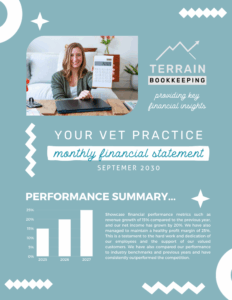 Running a veterinary practice is no small feat.
Running a veterinary practice is no small feat.
You’re juggling full appointment schedules.
Caring for patients.
Managing your team.
And maybe even trying to carve out a sliver of personal time (remember that?).
Amidst the chaos, sitting down to comb through your books might feel like the last thing on your list.
But here’s the thing—if you’re only glancing at your numbers once a year during tax season, you’re missing one of the most powerful tools to grow and protect your practice: monthly financial statements built specifically for vet clinics.
Think of them as regular wellness exams — but for your business.
Just like your patients need consistent checkups to stay healthy, your practice needs timely financial insights to stay on track, catch problems early, and make confident decisions.
Let’s dig into exactly why monthly financial statements matter for veterinary clinics, what they should include, and how they can transform your practice’s future.
Why Monthly Financial Statements Are Essential for Veterinary Clinics
 Would you tell a pet owner to wait until their dog is seriously ill before bringing them in?
Would you tell a pet owner to wait until their dog is seriously ill before bringing them in?
Of course not. You’d raher catch an issue early, when it’s easier and less costly to treat.
Your business is no different. Monthly financial reports act like routine diagnostics for your practice’s health, giving you a clear, consistent picture of where your clinic stands — not just once a year, but all year long.
With the right veterinary financial reporting, you can:
- Track trends early. Spot changes in costs, revenue, or client patterns before they become problems.
- Make informed decisions. Know when you can afford to hire, expand, or invest in new equipment.
- Work proactively with your CPA (instead of panic-emailing them in March).
- Be ready for big conversations — with your bank, CPA, or a potential buyer.
A Real-World Scenario
Imagine you notice a small uptick in supply costs three months in a row.
With monthly veterinary bookkeeping reports, you can investigate right away.
Maybe you find that a vendor quietly raised their prices.
A quick switch to another supplier could save you thousands over the course of a year.
Early action like that isn’t luck—it’s the result of regular, accurate vet clinic accounting.
What Should Be in Your Monthly Financial Statement
 Every month, you should be getting at least:
Every month, you should be getting at least:
- Profit & Loss Statement (aka: what you earned and what you spent)
- Balance Sheet (aka: what you own vs. what you owe)
- Cash Flow Statement (aka: how your money moved)
Bonus points for:
- Service-level breakdowns (so you can track profitability by service or location)
- Clear visuals and charts that make trends obvious at a glance
- Explanations that don’t require a finance degree
More Benefits of Monthly Financial Statements
Cash Flow Forecasting
Knowing what’s in your bank account today is helpful — but knowing what it will look like in three months is game-changing. Monthly statements make it easier to project income and expenses, helping you plan for seasonal dips, equipment purchases, or staffing changes without surprises.
Tax Planning
Instead of scrambling at year-end, you’ll know your tax position throughout the year. That means no more unpleasant surprises — and more opportunities to take advantage of deductions or tax-saving strategies before it’s too late.
Growth Planning
Thinking about adding a new location, expanding services, or hiring more staff? Regular financials give you the hard data to back those decisions, so you can move forward with confidence instead of guesswork.
Why Your Vet Clinic Needs a Veterinary Bookkeeping Specialist
 You could hire a generalist bookkeeper, but veterinary practices are a different breed (pun intended).
You could hire a generalist bookkeeper, but veterinary practices are a different breed (pun intended).
At Terrain Bookkeeping, we go a step further by using the AAHA Chart of Accounts and tailoring reports to the needs of veterinary practices specifically. We even prepare reports for Veterinary Management Group (VMG) members who report via Datalink—so we know exactly what metrics matter most in your world.
From industry-specific expense categories to tracking profitability across diverse service lines, it pays to work with someone who understands your terrain.
We’re QuickBooks Online Advanced ProAdvisors, and specialists in veterinary financial management. Our team combines accounting expertise with a genuine love for animals — and we’re here to help you translate your numbers into actionable insight.
Reduce Stress and Gain Peace of Mind
Let’s be honest: financial uncertainty keeps a lot of practice owners up at night.
- Peace of mind knowing you aren’t ignoring your finances for months at a time
No more feeling out of control
When you have clear, accurate monthly financials delivered every month, you get:

You can confidently answer questions like:
- “Can we afford to hire another tech?”
- “Do we need to raise our prices?”
- “Are we spending too much on inventory?”
You can easily see:
- Which services bring in the most revenue
- Where expenses are highest
- Which areas have the most growth potential
And, finally, you’ll know exactly where your practice stands today and where it’s headed tomorrow.
FAQ: Monthly Financial Statements for Vet Clinics
Do small clinics really need monthly statements?
Yes — in fact, smaller practices often benefit the most. When budgets are tight, catching a problem early (like rising supply costs or a drop in revenue) can make the difference between a quick fix and a financial crisis.
How are monthly statements different from annual reports?
Annual reports show you where you’ve been; monthly statements help you adjust course in real time. Think of annual reporting as looking in the rearview mirror, and monthly reporting as keeping your eyes on the road ahead.
Can I prepare these reports myself?
While you can DIY, working with a specialist in veterinary bookkeeping ensures your statements are accurate, compliant, and tailored to your unique needs. That way, you can focus on patient care instead of spreadsheets.
Ready to See the Difference?
Monthly financial statements aren’t just a compliance checkbox. They’re the foundation for:
- Better business decisions
- Healthier cash flow
- Higher profitability
- Less stress for you and your team
What to Do if You’re Not Getting Monthly Financials
 If your current bookkeeper only sends updates annually, or you’re not sure where to start, it might be time to work with someone who specializes in veterinary bookkeeping services.
If your current bookkeeper only sends updates annually, or you’re not sure where to start, it might be time to work with someone who specializes in veterinary bookkeeping services.
We help veterinary clinics across the country stay financially healthy and future-ready by providing consistent, accurate monthly financial statements — along with friendly, jargon-free support every step of the way.
When you can measure it, you can manage it.
And when you can manage it, your practice can thrive — no matter the terrain.
📅 Want to see what monthly reports could look like for your clinic? Let’s talk about how we can help you boost profitability, reduce stress, and make confident business decisions year-round.



